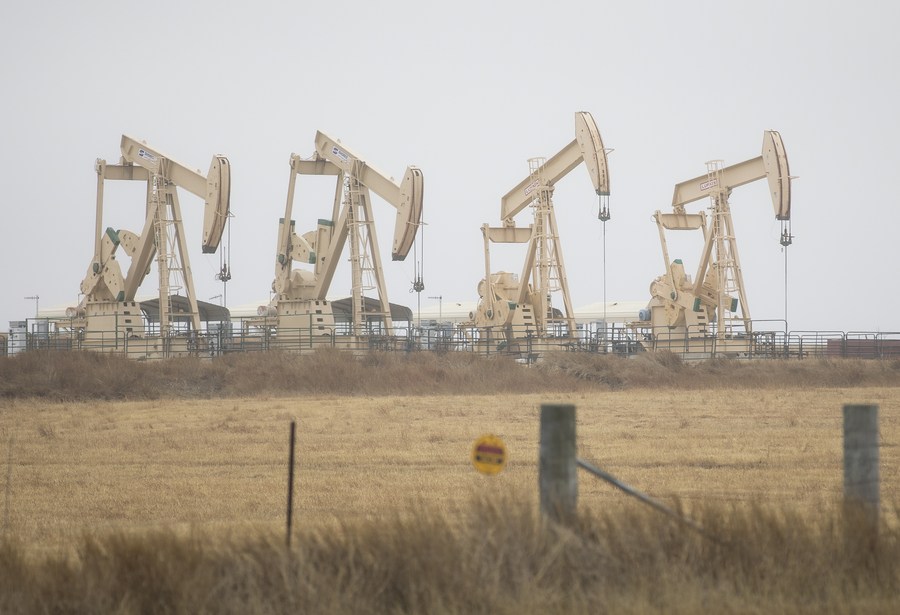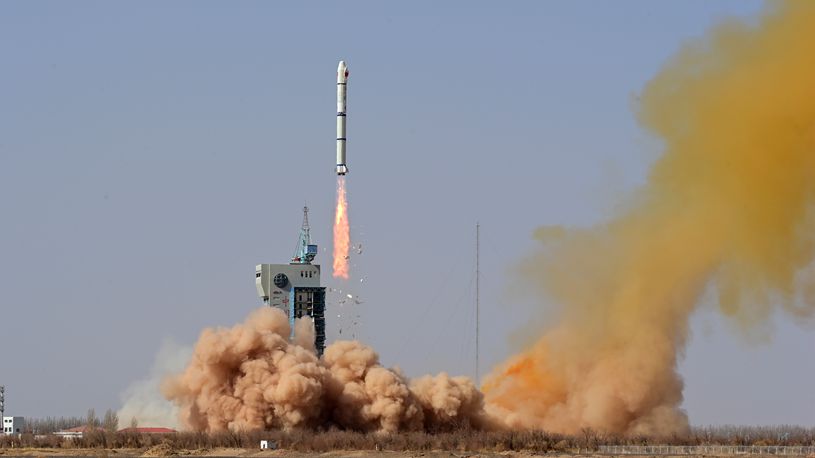Oil prices drop to 3-month low on U.S. banking turmoil, inflation worries

Oil derricks operate in Three Rivers, Texas, the United States on Feb. 24, 2022. (Photo by Nick Wagner/Xinhua)
The oil weakness came as traders were worried that U.S. regional banks' problems may have a negative impact on demand for oil.
NEW YORK, March 14 (Xinhua) -- Oil prices nosedived on Tuesday, as U.S. bank failures and still hot inflation readings raised concerns about recession risks.
The West Texas Intermediate (WTI) for April delivery shed 3.47 U.S. dollars, or 4.64 percent, to settle at 71.33 dollars a barrel on the New York Mercantile Exchange. Brent crude for May delivery lost 3.32 dollars, or 4.11 percent, to close at 77.45 dollars a barrel on the London ICE Futures Exchange.
Both the WTI and Brent saw the lowest close for a front-month contract since Dec. 9, according to Dow Jones Market Data.
On Monday, the U.S. crude benchmark dipped 2.45 percent, while Brent slid 2.43 percent.
The oil weakness came as traders were worried that U.S. regional banks' problems may have a negative impact on demand for oil.
"The oil market is acting like a recession is inevitable or at the very least, we are seeing serious deleveraging of oil contracts," Phil Flynn, senior analyst at The PRICE Futures Group, said in a note on Tuesday.
"The Silicon Valley Bank (SVB) bank failure and fears of contagion are still raging even as stocks find some stability," he said.
U.S. regulators closed California's SVB on Friday, after the tech-focused lender reported huge losses from securities sales, triggering a run on the bank's deposits.
The SVB collapse is the largest bank failure since the collapse of U.S. savings and loan association Washington Mutual in 2008, and was quickly followed by the closure of crypto sector lender Signature Bank on Sunday.
The failure of SVB and Signature Bank has raised concerns over potential losses on the bond holdings of other U.S. banks, many of which invested heavily in long-duration Treasuries following an influx of deposits during the pandemic. The value of these securities has fallen as the Federal Reserve has raised rates.
Also weighing on the oil market was a key U.S. inflation report.
The U.S. consumer price index (CPI) rose 0.4 percent in February, putting the annual rate at 6 percent, the Labor Department reported on Tuesday. The readings were in line with market expectations.
The core CPI, which excludes food and energy, rose 0.5 percent in February, above the 0.4 percent consensus, for an annual increase of 5.5 percent.
The report continued to show persistent inflation, likely to keep the Fed on track for another interest rate hike next week despite current banking scares, experts noted.
Traders also looked ahead to data on U.S. fuel inventories as the U.S. Energy Information Administration will release its weekly petroleum status report on Wednesday. Analysts surveyed by The Wall Street Journal expect the publication to show a climb of 100,000 barrels in U.S. crude-oil stockpiles for the week ending March 10.
Photos
Related Stories
- Trump won't appear before Manhattan "hush-money" grand jury: lawyer
- Reported hate crime incidents increase in U.S.: FBI data
- U.S. Senate Republican leader discharged from hospital: spokesperson
- Mexican president dismisses U.S. travel advisories
- First Republic Bank shares plunge amid fear of systemic contagion after SVB's failure
Copyright © 2023 People's Daily Online. All Rights Reserved.









